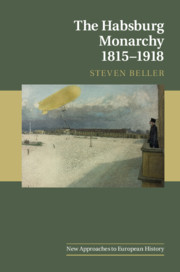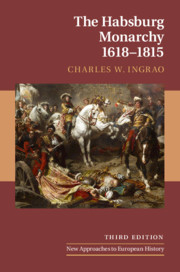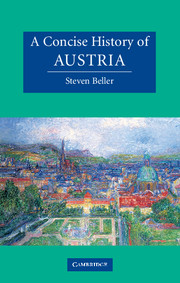The Habsburg Monarchy 1815–1918
Part of New Approaches to European History
- Author: Steven Beller
- Date Published: May 2018
- availability: Available
- format: Paperback
- isbn: 9781107464742
Paperback
-
This clear and compelling account of the Habsburg Monarchy in its last century explains why, a century after its disappearance, it has never been more relevant. With extensive discussion of recent historiographic controversies about the Monarchy's character and viability, Steven Beller presents a detailed account of the main strands of the Monarchy's political history and how its economic, social and cultural development interacted with this main narrative. While recognizing the importance of these larger trends, readers will learn how the historical accident of personality and the complexities of high politics and diplomacy still had a central impact on the Monarchy's fate. Although some would see the Monarchy as an atavistic irrelevance in the modern age, its multicultural, multinational experience and inclusive 'logic' was in many ways more relevant to our modernity than the nationalism that did so much to bring about its demise.
Read more- The book is a combination of an informed narrative with stimulating analysis that will engage readers at all levels
- Divided into self-contained chronological sections, each with overarching themes, and ideally suited to classroom discussion
- Takes full account of many of the newest controversies in the historiography of the subject
Reviews & endorsements
'Steven Beller has written a superb, eloquent, and magisterial history of the Habsburg monarchy over the course of its final century of existence. His nuanced analysis grapples with Austria-Hungary's virtues and vices, its durability and its doom - in brief, its qualities as an empire of ironies. A brilliant achievement!' Aviel Roshwald, Georgetown University, Washington DC
See more reviews'In this elegantly written and well-illustrated volume, Steven Beller explains how multi-ethnic, polyglot Austria-Hungary met the demands of modernity in an era of modern nation-states. Drawing on his deep knowledge of the region, Beller brings alive the Habsburg Monarchy whose legacy included the culture and thought that has shaped the modern world. Accessible and engaging, the book is sure to attract a wide audience.' Nancy M. Wingfield, Northern Illinois University
'Stephen Beller's new history of the Habsburg Monarchy is a tour de force. Beller's considerable research expertise is brought to bear in making a complicated and intractable period of European history accessible, and providing a very readable overview for that will be welcomed by specialist readers and the general public alike.' Tim Kirk, Newcastle University
'Steven Beller has written a clear-eyed, lucid account of the Habsburg Monarchy. He weaves a lively narrative of domestic and foreign affairs, giving due attention to both the political shenanigans in Vienna and Budapest and economic and cultural developments in the regional peripheries. The book draws connections between Central European modernization and modernity and explores who constituted 'the people' in a dawning age of mass politics. Beller traces how the Habsburg state, perceived as a 'European necessity' in the nineteenth century, collapsed, but nevertheless remained 'strangely present' in its successor states. A skillful historian, Beller authoritatively explains political and cultural conflicts of the age but manages to preserve the ironies and uncertainties that were the essence of Habsburg Central Europe. This extraordinarily learned account serves as a concise introduction to newcomers and poses provocative and playful might-have-beens that invite scholars to rethink what they thought they knew about the Monarchy.' Maureen Healy, Lewis and Clark College, Portland
'Beller's balanced and nuanced analysis … sets out a whole range of reasons why the monarchy finally collapsed. His account, exemplary in its concision and clear-headed analysis, will surely stand … as a starting point for future research on the subject.' Joachim Whaley, Journal of Modern History
Customer reviews
Not yet reviewed
Be the first to review
Review was not posted due to profanity
×Product details
- Date Published: May 2018
- format: Paperback
- isbn: 9781107464742
- length: 326 pages
- dimensions: 228 x 152 x 15 mm
- weight: 0.54kg
- contains: 25 b/w illus. 5 maps
- availability: Available
Table of Contents
List of figures
Introduction: Austria and modernity
1. 1815–1835: restoration and procrastination
2. 1835–1851: revolution and reaction
3. 1852–1867: transformation
4. 1867–1879: liberalization
5. 1879–1897: nationalization
6. 1897–1914: modernization
7. 1914–1918: self-destruction
Conclusion: Central Europe and the paths not taken
Bibliography
Index.
Sorry, this resource is locked
Please register or sign in to request access. If you are having problems accessing these resources please email [email protected]
Register Sign in» Proceed
You are now leaving the Cambridge University Press website. Your eBook purchase and download will be completed by our partner www.ebooks.com. Please see the permission section of the www.ebooks.com catalogue page for details of the print & copy limits on our eBooks.
Continue ×Are you sure you want to delete your account?
This cannot be undone.
Thank you for your feedback which will help us improve our service.
If you requested a response, we will make sure to get back to you shortly.
×




.jpg)


.jpg)